Travel can be an exciting and eye-opening experience, but it’s important to prioritize your safety while abroad. Follow these essential travel safety tips to ensure a secure and memorable trip.
Key Takeaways:
- Get to know your destination before you arrive to familiarize yourself with the safest neighborhoods and places to stay.
- Know whom to call in an emergency by noting the contact information for the nearest embassy, local police station, and other emergency departments.
- Blend in and protect your belongings by avoiding flashy clothing and investing in protective gear.
- Keep copies of important documents such as your passport and identification in case of loss or theft.
- Share your itinerary with trusted contacts so that someone always knows your whereabouts.
Get to Know Your Destination Before You Arrive
Prior to embarking on your travels, it is essential to conduct thorough research about your destination. By familiarizing yourself with the local environment, you can enhance your travel safety and make informed decisions throughout your journey.
Here are some valuable travel safety tips to help you know your destination:
- Read traveler reviews: Before you embark on your trip, take the time to read reviews from fellow travelers who have visited your destination. Their insights can provide valuable information about the safety of different neighborhoods, recommended accommodations, and general travel tips.
- Consult locals: Interacting with locals can provide insider knowledge about the safest neighborhoods and areas to avoid. Strike up conversations with hotel staff, tour guides, and friendly locals to gather valuable tips and recommendations.
- Check the State Department’s website: The U.S. Department of State website offers up-to-date information about international travel advisories, safety concerns, and potential risks in different countries. Checking this resource will help you stay informed about any potential security issues in your destination.
- Identify the safest neighborhoods: Determine the safest neighborhoods to stay in during your visit. These areas usually have lower crime rates and are well-patrolled by local authorities. By choosing accommodations in these neighborhoods, you can minimize potential risks.
- Enroll in the Smart Traveler Enrollment Program (STEP): Registering with the Smart Traveler Enrollment Program (STEP) allows the U.S. Embassy or Consulate in your destination country to reach you in case of an emergency. This program provides country-specific information, including safety updates, travel alerts, and contact details for the nearest embassy or consulate.
“Researching your destination in advance enables you to make informed choices and prioritize your safety while traveling. Take the time to gather information from various sources and leverage technology to stay updated throughout your journey.” – Travel Safety Expert
By following these travel safety tips and knowing your destination inside and out, you can make the most of your travels while ensuring your well-being is prioritized.
| Travel Safety Tips: Know Your Destination | Benefits |
|---|---|
| Familiarize yourself with the local environment | Enhanced travel safety |
| Access valuable insights from traveler reviews | Improved decision-making |
| Gain insider knowledge from locals | Insights into safe neighborhoods |
| Stay informed about travel advisories | Up-to-date safety information |
| Identify and choose accommodations in safe neighborhoods | Reduced risks |
| Enroll in the Smart Traveler Enrollment Program (STEP) | Emergency assistance and country-specific information |
Know Whom to Call in an Emergency
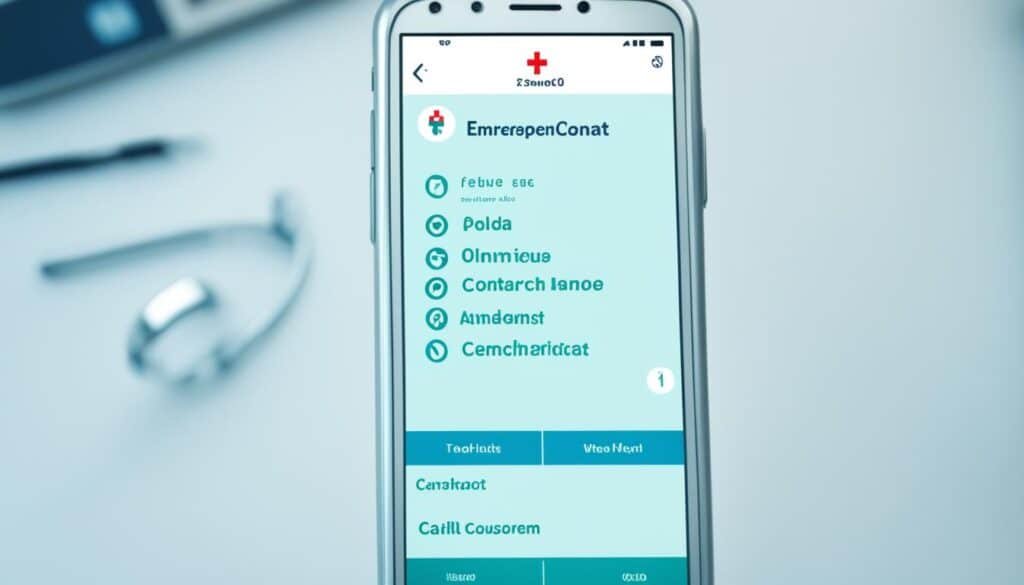
When you’re traveling, emergencies can happen unexpectedly. That’s why it’s crucial to know whom to contact to get the help you need quickly. By being prepared with the right contact information, you can ensure your safety and peace of mind during your trip.
Embassy or Consulate
In case of any emergencies related to your citizenship or legal issues, it’s essential to have contact information for the nearest embassy or consulate. They can provide guidance and support, including assistance with lost passports, emergency travel documents, or other legal matters that may arise.
Remember to always update yourself with the latest information regarding the operating hours and services provided by the embassy or consulate in your destination country.”
Local Emergency Departments
Knowing the contact details of local emergency departments can be a lifesaver in critical situations. Make a note of the contact numbers for the police, fire department, and ambulance services in the area you’re visiting. These services are usually available 24/7 and can respond swiftly to accidents, medical emergencies, or any other urgent situation you may encounter.
Travel Insurance Provider
If you have travel insurance, make sure to keep your insurance provider’s contact information handy. In case of emergencies requiring medical assistance or additional support, your travel insurance provider can offer guidance on the necessary steps to take, coordinate medical care, or provide assistance with claims.
Hotel or Lodging Management
When you arrive at your accommodation, take a moment to familiarize yourself with the hotel or lodging management’s contact information. If any safety concerns or emergencies arise within the property, whether it’s related to fire, security, or medical issues, the hotel staff can provide immediate assistance and contact the appropriate authorities if necessary.
Remember: emergencies can be stressful, but being prepared with the right contacts can help you navigate through difficult situations with ease. It’s always better to have the information you need and not need it, rather than the other way around.
Make sure to have a copy of this vital emergency contact information readily available, whether it’s in your phone, on a printed list, or stored securely in a travel app. By taking a few moments to prepare in advance, you can ensure a safer and more secure travel experience.
Blend in and Protect Your Belongings
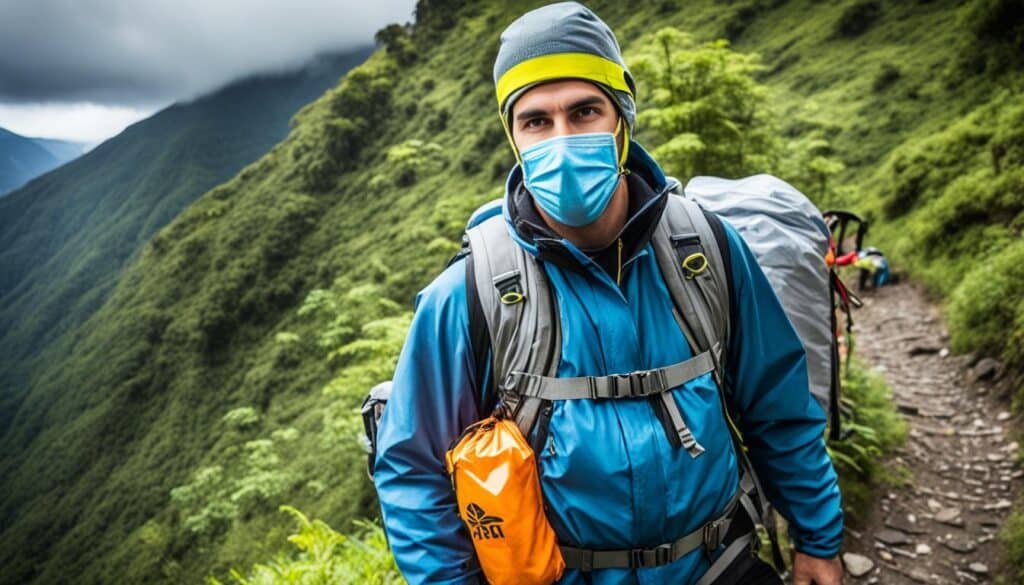
When traveling, it’s important to blend in with the locals to avoid standing out as a tourist. This not only helps you immerse yourself in the local culture but also enhances your safety by reducing the chances of becoming a target for theft. Here are some travel safety tips to help you blend in while protecting your belongings:
- Dress like a local: Avoid wearing flashy clothing or accessories that may attract attention. Instead, opt for clothing that reflects the local style and fashion trends. This simple step can go a long way in helping you blend in with the crowd.
- Invest in protective clothing and gear: Consider investing in protective clothing and accessories that can make it more difficult for pickpockets to steal your belongings. For example, a slim-fitting money belt worn under your clothing can keep your cash and important documents secure.
- Keep your valuables out of sight: Avoid displaying expensive items like cameras, smartphones, or jewelry in crowded areas. Use a discreet bag or backpack to carry your belongings and keep them close to your body.
“Blending in with the locals is a simple yet effective travel safety strategy. By adopting the local style of dress and keeping your valuables out of sight, you can significantly reduce the risk of pickpockets targeting you.” – Travel Safety Expert
Remember, the key is to avoid drawing unnecessary attention to yourself. By following these travel safety tips, you can blend in seamlessly with the locals and enjoy a safer and more secure travel experience.
Protective Clothing and Gear Recommendations
| Item | Description |
|---|---|
| RFID-blocking travel wallet | |
| Anti-theft backpack | |
| Hidden waist pouch |
Keep Copies of Important Documents
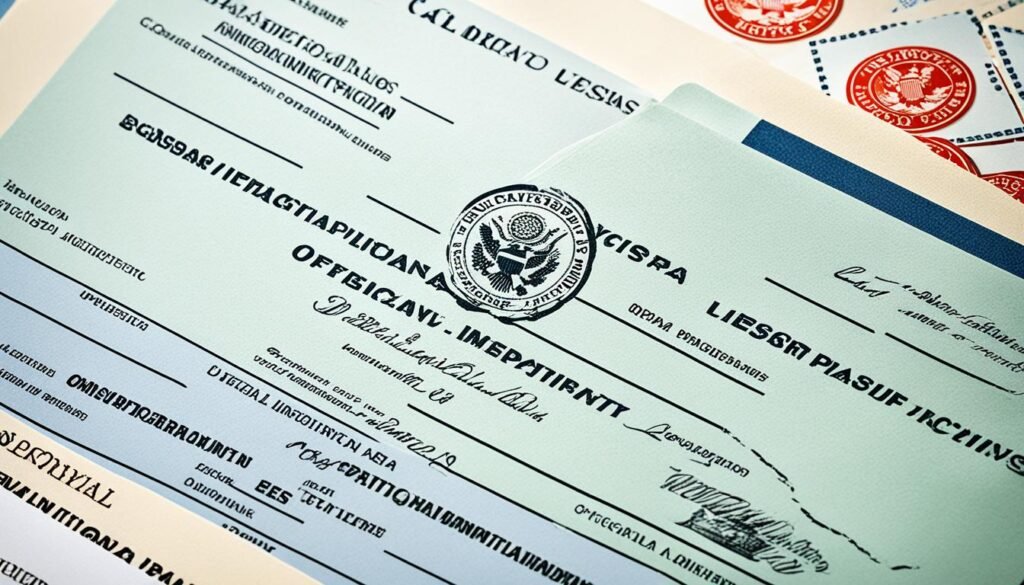
When traveling, it’s crucial to have copies of your important documents such as your passport and identification. This ensures that you have backup documentation readily available in case your originals are lost or stolen. To safeguard your travel experience, follow these simple steps:
- Scan and save: Make digital copies of your documents by scanning them and saving them securely online. This way, you can access them from anywhere in the world as long as you have an internet connection.
- Print multiple hard copies: Once you have saved the digital copies, print out several hard copies of each document. It’s a good idea to keep these copies in different locations, such as your carry-on bag, hotel safe, and with a trusted travel companion.
In the unfortunate event that your original documents are lost or stolen, having these copies can help expedite the process of obtaining replacements at the nearest embassy or consulate. It’s also a good practice to inform the local authorities about the loss or theft.
Remember: Keep your original documents and copies in separate and secure locations to minimize the risk of losing them all at once.
“Having copies of your important travel documents is essential for your peace of mind and security. It’s a small precautionary measure that can make a huge difference in times of unexpected emergencies.” – Travel Safety Expert
| Benefits | Reasons |
|---|---|
| Immediate access to identification | In the event of loss or theft of original documents, having copies readily available can aid in verifying your identity. |
| Facilitates replacement process | Embassy or consulate officials can process your replacement documents faster if you provide them with copies. |
| Peace of mind | Knowing that you have backup documentation gives you a sense of security during your travels. |
Share Your Itinerary with Trusted Contacts
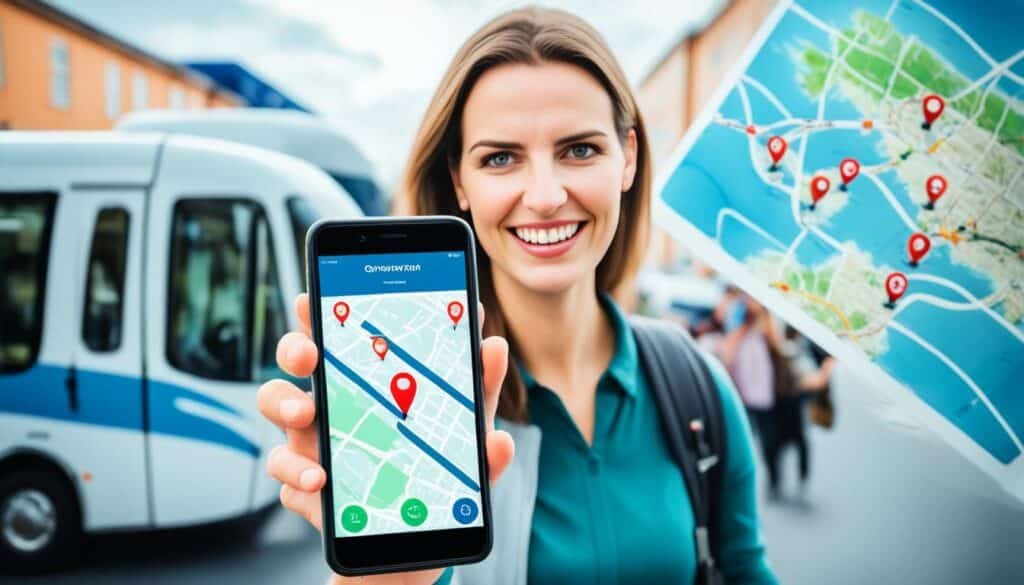
Before you embark on your trip, it’s important to share your itinerary with a few trusted friends or family members. By providing them with a copy of your schedule and keeping them updated on your whereabouts throughout your trip, you ensure that someone will always know where you are. This not only adds an extra layer of security but also gives you peace of mind knowing that there are trusted contacts who can help if anything goes wrong.
Sharing your itinerary with trusted contacts allows them to stay informed about your travel plans and makes it easier for them to reach out to authorities in case of an emergency. Whether you’re traveling solo or with a group, having a reliable support network that knows your location can be invaluable.
In addition to sharing your itinerary, it’s a good idea to establish regular check-in times with your trusted contacts. This way, they can expect to hear from you at specific intervals and can raise the alarm if they don’t receive an update within the agreed-upon timeframe.
Remember, it’s essential to choose people whom you trust implicitly with your personal information. Opt for individuals who are responsible, dependable, and willing to take action if needed. It’s also crucial to inform your trusted contacts about any changes to your itinerary or unexpected detours so that they can adjust their plans accordingly.
By taking the time to share your itinerary with trusted contacts, you add an extra layer of safety to your trip. So before you embark on your next adventure, make sure to communicate your travel plans to those who can be there for you when it matters most.
| Benefits of Sharing Your Itinerary |
|---|
| 1. Enhanced safety: By sharing your itinerary, trusted contacts can assist in emergencies and ensure your well-being. |
| 2. Peace of mind: Knowing that someone is aware of your travel plans can alleviate worries and anxieties while you’re on the road. |
| 3. Reliable support: Trusted contacts can offer assistance, guidance, and local insights if you encounter any difficulties during your trip. |
| 4. Quick response: In case of emergencies or unforeseen circumstances, your trusted contacts can alert authorities promptly, ensuring a faster response time. |
| 5. Adaptability: By keeping your trusted contacts informed about any changes to your itinerary, they can adjust their plans and provide support accordingly. |
Stay Alert and Secure Online
When traveling and using public Wi-Fi networks, it’s crucial to prioritize your online security. Hackers can easily access personal data transmitted over public Wi-Fi, putting you at risk of identity theft and other online security threats. To protect yourself, consider the following travel safety tips:
1. Set Up a Virtual Private Network (VPN)
A virtual private network (VPN) creates an encrypted connection between your device and the internet, ensuring that your online activities are secure and private. By using a VPN, your data is protected from eavesdropping and hacking attempts. Additionally, a VPN allows you to bypass region-based restrictions and access geo-blocked content.
“While using public Wi-Fi during your travels, using a VPN is a vital step to safeguard your personal information and ensure a secure internet connection.” – Cybersecurity Expert, Jane Smith
2. Avoid Accessing Sensitive Information
When connected to public Wi-Fi, avoid accessing or transmitting sensitive information, such as banking details, social security numbers, or passwords. It’s best to wait until you have a secure internet connection to perform any tasks that require such information.
3. Update and Secure Your Devices
Before your trip, ensure that all your devices, including laptops, smartphones, and tablets, are updated with the latest security patches and software updates. Enable device encryption and set up strong, unique passwords or biometric authentication methods to protect your data.
4. Be Cautious of Phishing Attempts
Stay vigilant and be cautious of phishing attempts disguised as legitimate websites or emails. Avoid clicking on suspicious links, do not enter personal information on unfamiliar websites, and always double-check the URL of the websites you visit.
5. Utilize Two-Factor Authentication
Enable two-factor authentication (2FA) on your online accounts whenever possible. This adds an extra layer of security by requiring a second form of verification, such as a code sent to your mobile device, in addition to your password.
By following these travel safety tips, you can protect your sensitive information, reduce the risk of identity theft, and ensure a secure online experience while traveling.
Enhance Room Safety Measures

When it comes to your hotel room, it’s important to prioritize your safety, even if the hotel already has security measures in place. By taking additional steps, you can further enhance the safety and security of your room.
Lock and Secure Your Door
Always remember to lock and dead-bolt your door when you’re inside your hotel room. This simple step can add an extra layer of protection. Additionally, ensure that all windows are closed and locked to prevent unauthorized entry.
Consider Using a Portable Jammer
To provide an extra layer of security, you can consider using a portable device called a jammer. This device can help protect your privacy by blocking signals from wireless cameras or listening devices that may be present in your hotel room. However, make sure to check the legality of using jammers in your destination before utilizing them.
“Enhancing the safety of your hotel room is crucial for a worry-free stay. By taking simple precautions like locking your door and considering devices like jammers, you can make your hotel room a safer and more secure space for your peace of mind.”
By implementing these room safety measures, you can have a more secure and comfortable experience during your travels. Remember to stay vigilant and report any suspicious activity to hotel staff or local authorities.
Trust Your Instincts and Stay Alert
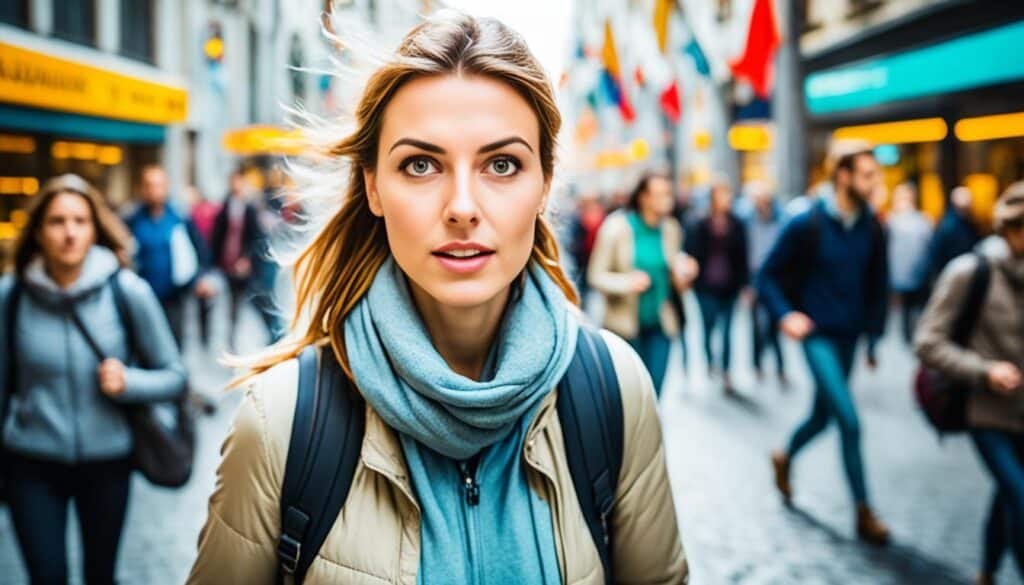
While traveling, it’s important to prioritize your safety by trusting your instincts and staying alert to your surroundings. By being aware of your surroundings, you can detect any potential threats or suspicious activities and take appropriate action to avoid any dangers. Remember these essential travel safety tips to enhance your security:
- Trust your instincts: Your instincts are your most powerful tool when it comes to personal safety. If someone or something seems suspicious or doesn’t feel right, it’s best to trust your gut feeling and leave the area immediately. Don’t ignore any lingering feelings of discomfort or unease; your intuition often knows best.
- Stay alert: Pay close attention to your surroundings, especially in crowded or unfamiliar areas. Avoid distractions such as excessive use of smartphones or wearing headphones that impair your ability to hear. By staying alert, you can spot potential threats and take prompt action to protect yourself.
- Keep an eye on your personal belongings: Whether you’re in a bustling city or a quiet village, always keep a watchful eye on your belongings. Be cautious of pickpockets and maintain a secure hold on your bags and valuables. Consider using a money belt or a secure travel wallet to store your cash, cards, and important documents.
- Use good judgment when interacting with strangers: While it’s common to meet new people while traveling, it’s essential to exercise caution when interacting with strangers. Avoid sharing personal information or divulging details about your travel plans with people you’ve just met. Trust your instincts when it comes to accepting drinks, invitations, or other offers from unfamiliar individuals.
Remember, your safety should always be your top priority. Trusting your instincts and staying alert can significantly reduce the risk of becoming a victim of crime while traveling.
By following these travel safety tips, you can have a more secure and enjoyable travel experience. Your instincts and awareness are powerful tools that can help keep you safe. Trust yourself and stay vigilant throughout your journey, and remember that being alert doesn’t mean being paranoid; it means being proactive and prepared.
| Travel Safety Tips: Trust Your Instincts and Stay Alert |
|---|
| 1. Trust your instincts |
| 2. Stay alert |
| 3. Keep an eye on your personal belongings |
| 4. Use good judgment when interacting with strangers |
Streamline Your Wallet and Protect Your Identity
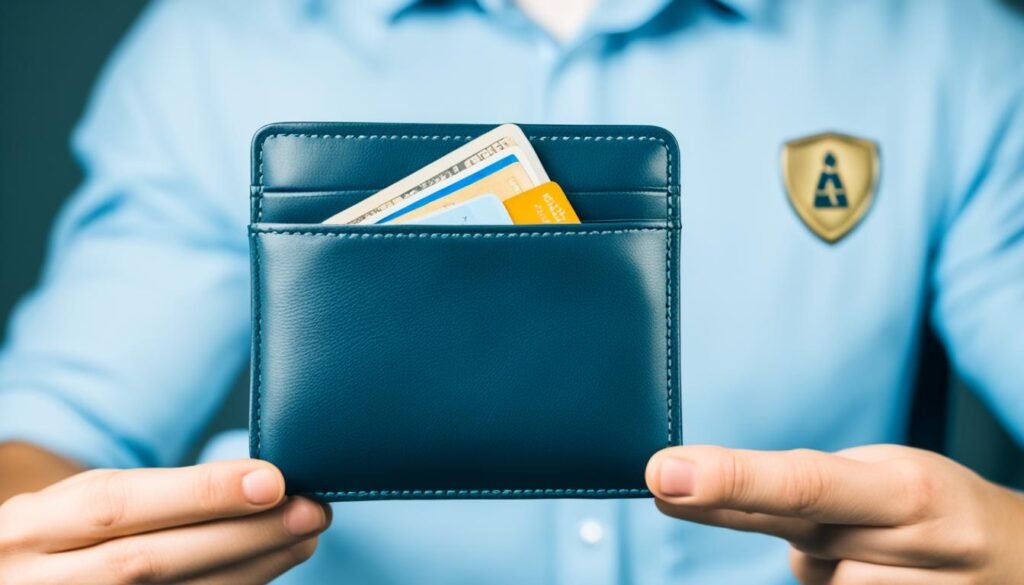
When it comes to travel safety, one important aspect often overlooked is protecting your identity and minimizing the risk of financial loss. By streamlining your wallet and taking a few simple precautions, you can safeguard your personal information and travel with peace of mind.
Travel Safety Tips: Streamline Your Wallet
A cluttered wallet can increase the chances of losing essential items or becoming a target for identity theft. Here are some travel safety tips to streamline your wallet effectively:
- Carry only the necessary cards: Before embarking on your trip, carefully assess the cards you typically carry in your wallet and remove any that you won’t need while traveling. This will not only reduce the bulk of your wallet but also minimize the potential impact of losing sensitive information.
- Leave unnecessary items behind: While it may be tempting to pack items such as checkbooks or store loyalty cards, it’s best to leave them at home. These items not only add unnecessary weight to your wallet but also carry the risk of identity theft if misplaced or stolen.
- Photocopy important documents: Make digital or physical copies of essential documents like your passport, driver’s license, and credit cards. Store these copies in a secure location separate from your wallet. In case your wallet gets lost or stolen, having backup information readily available will help you recover more quickly.
Protecting Your Identity
While streamlining your wallet is a crucial step in protecting your identity, there are other proactive measures you can take:
- Securely store credit card information: Consider utilizing a password-protected digital wallet or secure online platform to store additional credit card information and contact numbers. This can come in handy if your wallet is lost or stolen, allowing you to cancel cards promptly and minimize the risk of financial loss.
- Remain vigilant of your surroundings: Whether you’re in crowded areas, using public transportation, or making purchases, always stay aware of your surroundings. Shield your PIN when entering it, and be cautious of anyone attempting to gain unauthorized access to your personal information.
- Monitor your accounts regularly: Keep a close eye on your bank and credit card accounts throughout your trip and upon your return. Report any suspicious activity immediately to the financial institution involved. Prompt action can help mitigate potential damage and prevent further unauthorized access.
“Protecting your identity while traveling is an essential part of travel safety. Streamlining your wallet and implementing security measures can significantly minimize the risk of identity theft and financial loss.” – Travel Safety Expert
By following these travel safety tips, you can streamline your wallet, protect your identity, and enjoy a worry-free journey. Remember, prevention is key when it comes to travel safety, so take the necessary precautions to safeguard your personal information.
Research and Plan for Safety
Before embarking on a journey, one of the most important travel safety tips is to thoroughly research your destination. Familiarize yourself with the local customs, traditions, and laws, as this knowledge can help you navigate cultural differences and avoid unintentional offenses. By understanding the local culture, you’ll be able to show respect and build positive connections with the people you meet along the way.
Another crucial aspect of planning for safety is researching transportation options in your destination. Look for reputable taxi services or ridesharing companies that have a strong reputation for reliability. Additionally, consider downloading a mobile app that provides real-time transportation updates, ensuring you stay informed about any changes or disruptions that may affect your travel plans.
An essential safety step is identifying the nearest U.S. Embassy or Consulate in your destination. Store their contact information, including phone numbers and addresses, in a secure and easily accessible location. In case of an emergency, having this information readily available can be invaluable, providing you with access to consular services and assistance.
“Researching and planning for safety is an important part of any trip. By taking the time to gather information on your destination, transportation, and emergency contacts, you can make informed decisions and be well-prepared for any unforeseen circumstances that may arise.”
Also Read: Best Travel Backpack Picks For Adventurers
Conclusion
Traveling can be a wonderful experience, but it’s essential to prioritize your safety throughout your journey. By following these essential travel safety tips, you can enhance your security, protect your belongings, and minimize potential risks.
Remember to always trust your instincts and stay alert to your surroundings. Pay attention to your personal belongings and avoid wearing flashy clothing or accessories that may make you stand out as a tourist. It’s also crucial to research your destination beforehand, familiarize yourself with the safest neighborhoods, and know whom to contact in case of an emergency.
Additionally, streamline your wallet by carrying only the necessary cards and store copies of important documents such as your passport and identification. Share your itinerary with trusted friends or family members, and stay mindful of your online security when using public Wi-Fi.
By taking these precautions and planning for safety, you can have a safe and enjoyable travel experience. So remember, prioritize your safety, follow these travel safety tips, and embark on your journeys with peace of mind.
FAQs
Q: What are some essential travel safety tips for secure trips?
A: Some essential travel safety tips include always carrying a copy of your passport, staying aware of your surroundings, using a travel lock on your luggage, and making a list of emergency contacts.
Q: How can I protect myself from common travel scams?
A: To protect yourself from common travel scams, be cautious of strangers offering help, avoid sharing personal information with strangers, and be skeptical of deals that seem too good to be true.
Q: Is it important to get travel insurance before going on a trip?
A: Yes, it is important to get travel insurance before going on a trip to protect yourself in case of unexpected circumstances such as trip cancellations, medical emergencies, or lost luggage.
Q: What should I know about using ATMs while traveling internationally?
A: When using ATMs while traveling internationally, make sure to use machines located in safe, well-lit areas, cover the keypad while entering your PIN, and notify your bank of your travel plans to avoid any issues with your card.
Q: How can I stay safe while traveling alone?
A: To stay safe while traveling alone, it is important to let someone know your itinerary, avoid displaying valuable items in public, blend in with the local culture, and trust your instincts if something feels off.
Q: What are some valuable safety tips everyone should know when traveling abroad?
A: Some valuable safety tips everyone should know when traveling abroad include researching the local emergency services, using a local SIM card for communication, and being cautious of using public Wi-Fi networks.
Q: How can I ensure water safety while traveling to different destinations?
A: To ensure water safety while traveling to different destinations, always drink bottled water, avoid ice in drinks, and be cautious of consuming raw or undercooked food that may be contaminated.
Source Links
- https://www.rainn.org/articles/safety-tips-traveling
- https://www.travelers.com/resources/home/safety/travel-safety-tips
- https://www.nationwide.com/lc/resources/home/articles/travel-safety-tips
